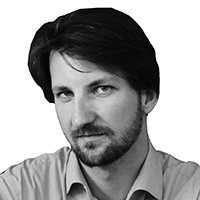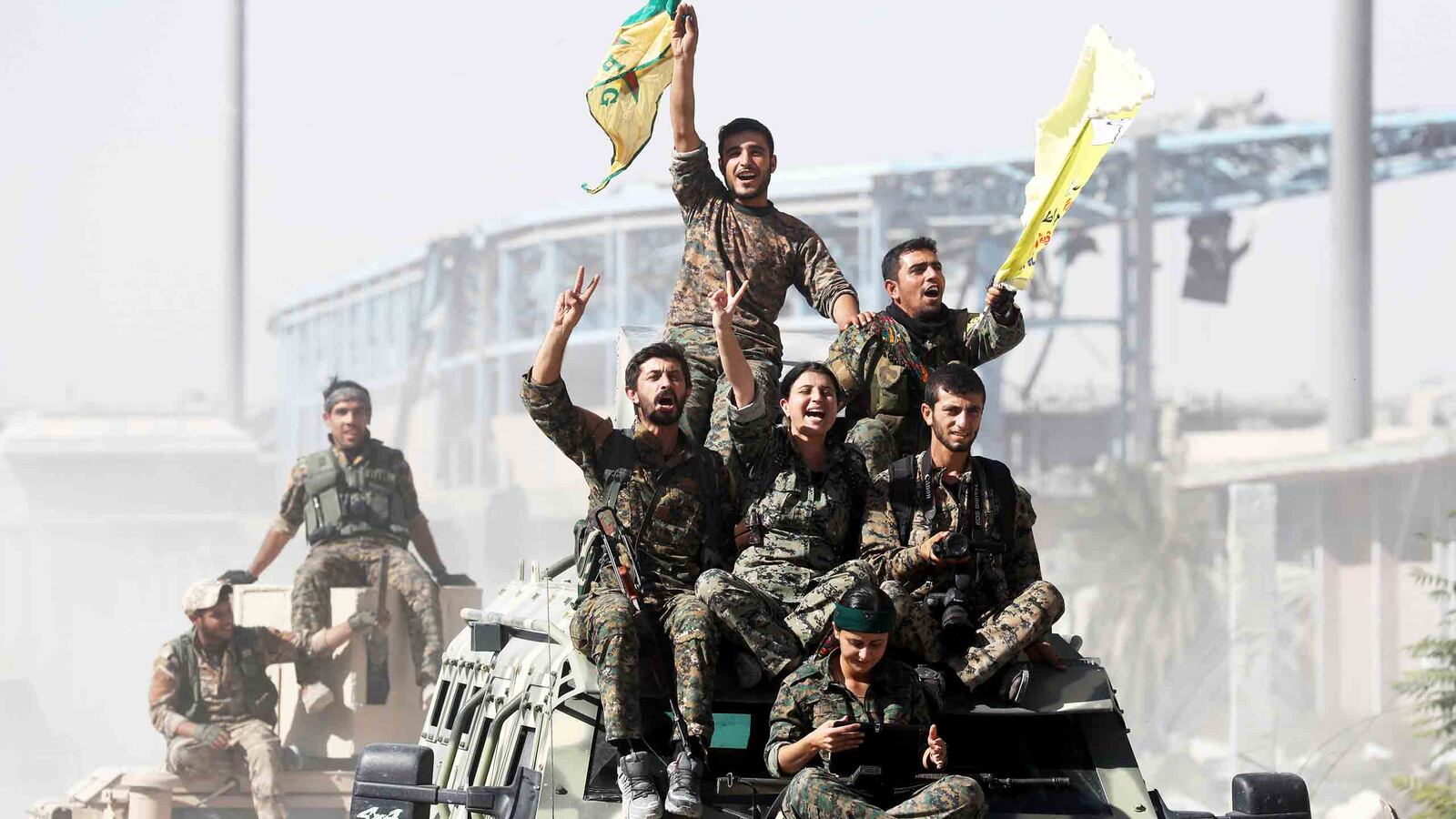RAQQA, Syria—There never was a lot about the square called al Naim—paradise—that seemed to justify its heavenly name. This is a dry and dusty city, and the square is more of a traffic circle, but there’s an island of green at its center, and there were a lot of colorful shops and cafés around it where people would come for tea or ice cream.
Then the Islamic State came here, and made this hub at the center of its de facto capital one of its favorite venues for executions. Anyone who witnessed what went on here can tell you that Paradise Square became Hell.
The zealots of ISIS loved to kill, supposedly to enforce their laws, but just as often simply to demonstrate their power over their captive subjects. They turned the city’s “black stadium” into a vast house of horrors. In another part of downtown they threw gay men from the tops of buildings.
Always they liked to gather crowds around, and al Naim in the center of town was one of the easiest places to do that: so they brought suspected spies here to be shot in the head. Other prisoners were lashed. Still others were decapitated and their heads put on fence posts where ISIS volunteers from all over the world, including Europeans and Britons, liked to pose with the gory relics of what ISIS called justice.
So when the last known fighters of ISIS were expelled or exterminated in Raqqa last month by the largely Kurdish-led Syrian Democratic Forces backed by Western airpower, the victorious fighters, including some women combatants, took special joy dancing in the dust of Paradise Square. Black had been the color of ISIS—the flags, the uniforms of the executioners, the heavy head-to-toe cloaks that had to shroud all women. Now bright flags draped the buildings.
But for those foreign volunteers from Europe and the United States who came here not to join ISIS, but to fight it, the moment of victory raised a whole new set of problems. Many of them, feeling that their war has been won, want to go home. But if they do, many could face arrest and prosecution.
Kimberly “Kimmie” Taylor, 27, from Blackburn, England, probably is the best known of these volunteers on the international scene, and her future is especially uncertain, not least because she’s reluctant to give up the fight.
“They beheaded people here and put their heads on spikes,” she said as we talked in Naim Square. “It is a very symbolic place, especially for us, the YPJ,” she said, referring to the largely Kurdish Female Protection Units.
Taylor gained a lot of respect among the Kurdish fighters over the last eight months of combat, and the female commanders had her stand next to them when they announced the liberation of Raqqa.
“We turned this around,” she said, claiming the square and the city as “a place where women liberated women.”
“It feels so great and is such a relief since it has been liberated,” Taylor said with a broad smile. But then she added, “I’ve seen too much, and I am tired, and a lot of friends were killed and injured.”
Unlike most foreign volunteers for combat, who are interested mostly in fighting ISIS, Taylor speaks with revolutionary zeal about defeating fascism—Islamic extremism—alongside her comrades in the the Kurdish forces whose ideological roots, going back decades in Syria and Turkey, are on the hard left. She says she is committed to contribute to the “new democratic system we are building” and also to work with civil society for women’s rights.
Going back to Britain just now might be an option, she suggests, but not a particularly pleasant one. Ironically the taint of “foreign volunteer” that attaches to ISIS fighters tends to prejudice the case of the other volunteers who set out to hunt and kill them. "And association with the YPJ, which Turkey accuses of being linked to the PKK, which has been branded a terrorist organization by Britain and the United States—all that makes things more complicated still. Although Syrian Kurds deny the link to the PKK.
“I am already under investigation for terrorism, so what can I do?” Taylor asks rhetorically. “Like, I will stay here, berxwedan jiyanê [resistance is life],” she said, quoting one of her group’s mottoes.
“If you call yourself a revolutionary, you should be able to get through anything. Any situation that presents itself, you should get through. And I will get through that as well. With all the media I have done, people in Britain support me. I think it would be very, very difficult for me to be imprisoned for terrorism.”
But other foreign volunteers are not so confident, and do not want to be filmed or interviewed.
“Is the camera still on?” one Westerner asked me at a base for foreign volunteers in Syria.
“No, it’s off,” I said.
Later the same fighter asked the same question, checking and double checking to make sure I had no record of him in the combat zone.
“Kimmie” Taylor thinks the UK wants to scare foreign volunteers.
“Why would I be afraid of them. If I am not afraid of Daesh [ISIS], why would I be afraid of the British police? I will get through this and hopefully have the support of the British people. It’s hypocritical and stupid that the British state does this, when the British military is here helping alongside the Syrian Democratic Forces (SDF).”
***
Inside Raqqa, I met another British volunteer who would talk to me, 24-year-old Jac Holmes.
Unlike Taylor. He was concerned about arrest in the U.K., but he did seem anxious to go home. He’d been in the fight for months, an “old guy” by Raqqa combat standards, and his agreed enlistment was just about up.
“All old guys like me will go home once the six months are over,” Jac Holmes told me.
Then, a few days later he was killed trying to defuse a mine.
Many of the volunteers have little taste for the multi-front war that is developing. The Kurds and Turkey look like they will fight near Efrin in the northwest of Syria, while the Kurds will be up against the Syrian government, backed by Iran and Russia, in the region around Deir az-Zour.
Last Friday, the Syrian government ousted ISIS from Deir az-Zour city and most likely tensions will increase between the U.S.-backed Kurds and the Syrian government backed by Iran.
The Iranian government has also threatened the U.S.-backed Kurds, saying Syrian troops will soon march on Raqqa itself. Iranian-backed militias also threatened to take the Syrian town of Abu Kamal from Iraq.
The YPG foreign volunteer sniper team warned on Facebook that Iranian-backed militias should not try to help the regime take Raqqa
“This will be the grave for both,” the post said. “Just till the end of Raqqa battle we have more than 10,000 new fighters.” .
Arges Artegia, 44, a volunteer from Spain who fought for months in Raqqa, says it’s unlikely foreign volunteers will get involved in the fight in Deir az-Zour.
“They don’t bring us to the front line there,” he said. On the other hand he dismisses the rumors that the Syrian government will march towards Raqqa. “Russia doesn’t support this,” he figures.
“I hope after three wars I can go home,” Artegia said. “I feel good, but I lost many friends and I am sad because they are not here to see the liberation” of all Kurdish territory, he said.
American volunteer John Duttenhofer, 24, from Colorado Springs, doesn’t rule out a fight between the Syrian government and the Kurds, but he’d rather have no part in that.
“On the outskirts of Deir az-Zour they are going to be regime Doshka trucks, very large weapons, rockets. We have sniper rifles, but it doesn’t compare. If there is a fight with the regime, I don’t want to fight the Russians, I need a whole different set of equipment,” he said.
“Probably, I will have a little vacation, go to the U.S. I don’t know how things turn out here, but staying here doesn’t sound like a fruitful endeavor for me,” he said.
“I don’t want to get trapped with the political situation in Iraq and Turkey and all that,” Duttenhofer said.
***
Jehad Brusk, a volunteer from New York, told The Daily Beast, that it’s still not clear to him what Western volunteers will do.
“Maybe we go back to our bases, or do whatever guard work is left to do. I gave up a lot of things to come here, a job in New York,” Brusk said. “I haven’t decided yet what I will do, maybe a new career. … Defense contractor?” he joked.
The foreign volunteers are not very optimistic about future U.S. support for the Kurds in Syria, even though to this point they have been Washington’s closest allies in the fight against ISIS.
The Syrian Kurds note that after Iraqi Kurds made a bid for independence, the United States did not back them against an onslaught of Iraqi government troops alongside Iranian-organized Shia militias re-taking contested areas.
The same scenario as in Iraq, the government moving to retake Kurdish-claimed territory, “has now happened in Syria,” Ali Akbar Velayati, a foreign policy advisor to Iran’s Supreme Leader Ali Khamenei, warned on Saturday.
“The central government in Damascus has every right to act decisively to punish the U.S.-backed separatists, and send in troops to seize the city, and the oil fields, and territory around it,” he added.
“I don’t have high hopes,” Duttenhofer said. “The oil interest might keep them [the Americans] here, but I don’t think they are invested in Kurdistan or stay here for the people. I think they are for profit, and that’s about it.”
Kimmie Taylor is more upbeat. The West is obliged to continue its support for its own selfish interests, she says.
“They are obligated, too, because the regime is now in Deir az-Zour with the support of Russia,” she said. But even a withdrawal of U.S. support would not be a disaster in Taylor’s opinion. “We [the YPG/YPJ] know how to play politics, too, just as they do, and if they leave, we have the support of Russia.”
The Americans “are obliged to stay here,” said Taylor, “even if they don’t want to.”






